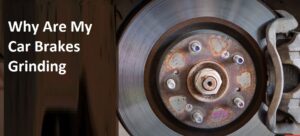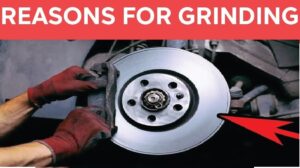A brake grinding sound is caused when the brake disc and caliper make contact during the braking process. This sound is produced when we press the brake pedal. Brake grinding is a common fault while driving. It can affect vehicle working performance, causing some safety errors.
In this post, we will cover details for brake grinding and causes with solutions.
Causes of Brakes Grinding

There are many causes for brake grinding that are explained here.
Worn brake pads:
- Pad structures made with certain materials have friction that presses brake discs for reducing car speed.
- With time, material quality reduces; when high wear occurs, the metal blacking plate presses on the disc directly, which causes high grinding noise and can damage the disc.
Damaged discs:
- Brake discs work under high pressure and temperature. Heavy braking and overheating can damage discs. That damaged disc also causes noise at the time of braking.
Read also 30 Different Types of Trucks & Uses
Sticking brake calipers
- Caliper squeeze pads over discs. If one sticks, it applies force to the constant pad connection, making it uneven and causing a grinding sound, also for slow braking.
Debris in the brakes:
- small grit stuck between discs and pads. that can cause sound
Worn Brake Rotor
- Brake rotors have flat metallic disks that reduce car’s speed when the calipers squeeze the pads.
- water, dust, or a stuck or damaged rotor that causes rusting.
- If the rotor is damaged, it causes a grinding noise; after that, the rotor is replaced with a new one. Rotors work longer as compared to brake pads. The normal working life of a brake rotor is 50,000 to 70,000 miles.
Low-Quality Brake Pads
- if brake pads are of low quality, they will, with time, wear and cause noise
Braking System Needs Lubrication
- The braking system of the vehicle has a complex design that has different parts and that needs lubrication after some time.
- If proper lubrication is not added, a grinding noise occurs during braking, which results from the caliper bolts.
- Caliper bolts help to securely configure brake calipers in position. But longer use causes rusting, which causes a grinding sound.
- So proper oiling and lubrication cause increases in working life,
Car Has Not Driven in a Long Time
- If you do not drive a car for a long time, rust causes braking noise. There can be a cause of braking noise due to brake fluid, a damaged battery, or damaged tires.
- So drive normally once a month to avoid noise.
How to Fix A Grinding Noise of a car

There are some steps for solving the grinding noise of a car.
Find the affected wheel.
Read also Do All Cars Have A Catalytic Converter
- First, find the noise source causing the noise error. If we find an affected wheel, it helps to easily solve and find the fault.
Disconnect the Wheel and Brake Caliper
- After finding the noise source, we are now sure to perform the work. Remove the wheel and brake caliper first.
- If you pull the wheel, you can see the clear sign.
Check Brake Pads and Rotor
- Now check the brake pads and check their thickness. The thickness for new brake pads is 3/8 to 1/2 inch.
- When the pad thickness reduces to 1/4 inch, replace it. For pads with a thickness of about 1/8 inch, no grinding noise is produced.
- Rotor inspection is different, where thickness is not measured, but surface appearance is checked.
- Rotor faces need to be smooth and without error.
- If you find any damage on the surface, replace it now. Brake pads and a motor were changed in pairs.
Check Stuck Stones
- Small stones do not cause damage. but stuck in the brake and can cause a sound. For managing noise, brake pads come with shims for stopping noise.
- that needed to use new pads; fast inspection is best for finding brake noise
Professional service
- If you do not know about the braking system, get the service of professionals.
Prevention tips for Grinding Sound for Braking
Brake inspections
- brake maintenance and inspection of the main vehicle service. Following the vehicle manufacturers’ instructions is important.
- Not wait for grinding noise, but proper replacement of pads and brake inspection provides damage to rotor
Uniform braking methods
- If you apply fast and aggressive brakes, that can damage pads and cause grinding. Follow smooth braking, since gradual brakes avoid damage, increase the working life of brakes, and increase fuel efficiency.
brake fluid flushes
- Brake fluid contamination corrodes parts of the brake and minimizes braking work. Proper fluid flushes are important for the working of brakes.
- Timely brake fluid flushes increase brake’s working life
warning condition
- If brakes are not working well, do not ignore. Soft brake pedal, vibrations, and any other signs must be considered.
- Early detection can avoid small errors that cause grinding and other faults.
Maintenance
- Inspect brakes on a regular basis; that helps to detect faults promptly, and follow smooth braking rules for avoiding grinding sounds and making sure brakes are working well.
- These methods help to increase working life.
FAQ
Read also What Is Ozone Treatment for Cars
Are grinding noises from braking systems hazardous or bad?
- Brakes are the main factor for vehicle safety. If you find any alarming signs, such as brake grinding, during driving, solve it.
How much does it cost to have broken brakes and rotors replaced?
- Brake repair comes with new calipers, new rotors, pad replacement, and labor costs included, which is 500 to 1000 dollars.
- For parts replacement, the cost is 1000 to 1500 dollars.
Why are my brakes grinding after new pads and rotors?
- If you replaced pads or rotors, debris got stuck at the time of repairing. So when we continue driving, it can be removed.
- But if we replace brake pads and not rotors, the grinding noise causes rotor damage.
Can brake fluid cause a grinding noise?
- If brake fluid is depleted, it is not able to compress brake pads. that causes nonuniform damage to brake pads and causes grinding noise during braking
Does ABS cause grinding noise?
- Yes, the ABS controller causes a grinding sound. Small vibrations are observed in cars.
- If you hear noise, set foot on the brake pedal. apply stronger pressure on the brake pedal than leave it
How Long Can We Drive on Grinding Brakes?
- Try to prevent driving with grinding brakes. If pads are worn, there is a sign of noise through squealing.
Can low brake fluid cause grinding?
- If you face any noise during braking, that is due to low brake fluid or other faults. Normally, hearing sounds are scraping or grinding noises.